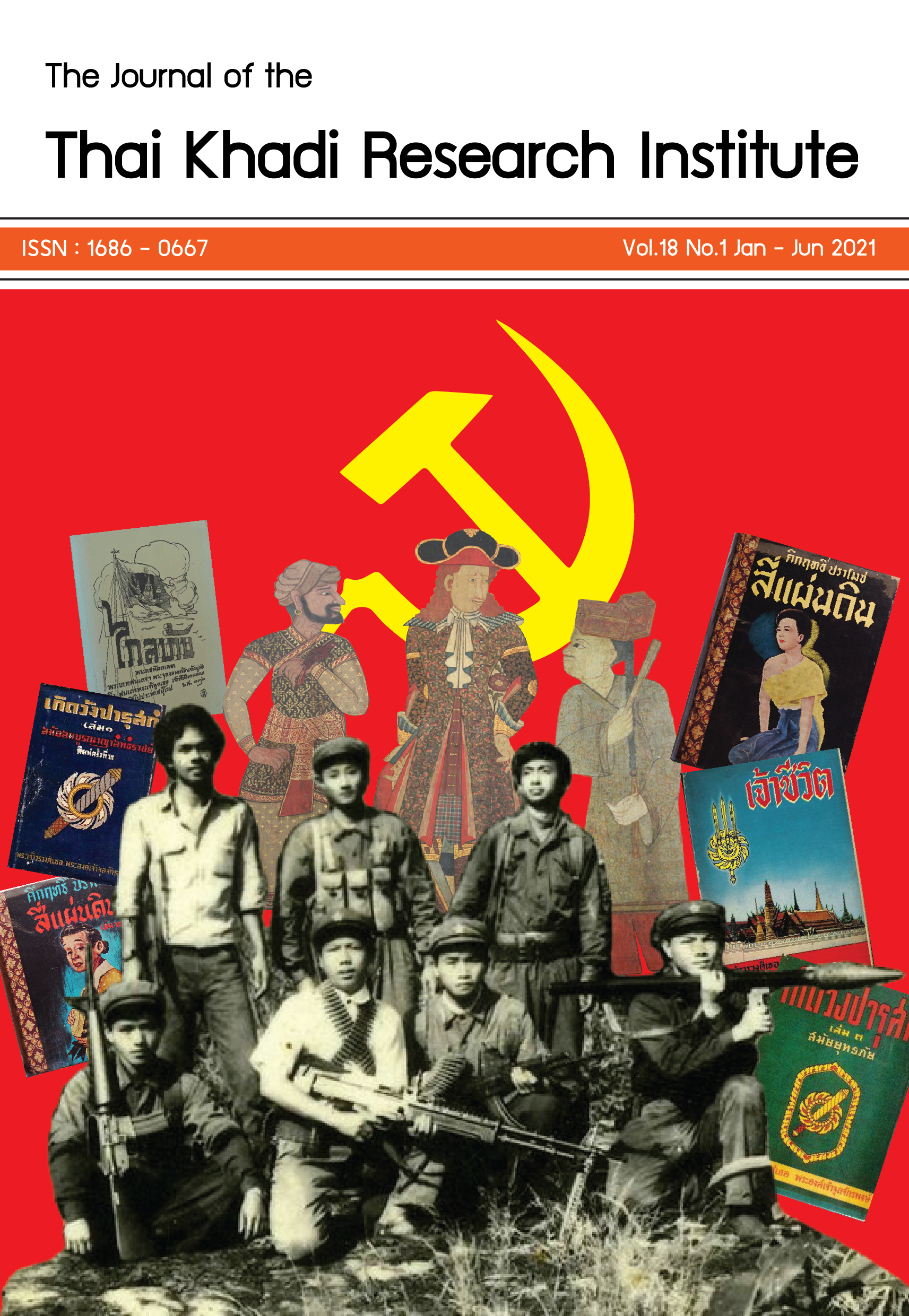โลกของคนรับเลี้ยงสุนัขจรจัด: ประสบการณ์ชีวิต มุมมอง และการให้ความหมาย
Main Article Content
บทคัดย่อ
ด้วยรูปร่างที่เปลี่ยนไปของสุนัขและพฤติกรรมการเลี้ยงสุนัขที่ขาดความรับผิดชอบ ขาดความพร้อม และความเข้าใจที่ถูกต้อง ประกอบกับภาครัฐยังไม่มีมาตรการควบคุมการเลี้ยงสุนัขที่มีความชัดเจน จนส่งผลให้เกิดปัญหาสุนัขจรจัดตามท้องถนนที่สร้างความเดือดร้อนให้กับประชาชนโดยทั่วไป แต่กลับมีบุคคลจำนวนหนึ่งที่แสดงออกถึงความต้องการในการให้ความช่วยเหลือและรับเลี้ยงสุนัขจรจัดมาเลี้ยงที่บ้านของตนเอง บทความนี้จึงมุ่งศึกษาถึงกระบวนการเป็นผู้รับเลี้ยงสุนัขจรจัดผ่านมุมมองและประสบการณ์ชีวิตที่เกิดขึ้นจริงของคนเก็บสุนัขจรจัดมาเลี้ยงไว้ในบ้านของตนเองจำนวน 7 คน ผลการศึกษาพบว่า ผู้ให้ข้อมูลหลักนำสุนัขจรจัดมาเลี้ยงที่บ้านของตนเองเป็นผลมาจากการพบเห็นสุนัขจรจัดได้รับบาดเจ็บ พิการ และไม่สามารถช่วยเหลือตนเองได้ หากปล่อยไว้อาจส่งผลให้สุนัขได้รับบาดเจ็บสาหัสจนถึงแก่ความตาย หรือมีความผูกพันระหว่างผู้รับเลี้ยงกับสุนัขจรจัด ซึ่งพัฒนาไปสู่ความรู้สึกถึงความเป็นเจ้าของสุนัขจรจัดและตัดสินใจให้ความช่วยเหลือด้วยการรับสุนัขจรจัดมาเลี้ยงที่บ้านบนพื้นฐานที่ได้รับพลังสนับสนุนจากครอบครัว อารมณ์ร่วม ความสำเร็จ และทัศนคติที่ดีต่อการมองสุนัขจรจัด
ทั้งนี้ หลังนำสุนัขจรจัดเข้ามาเลี้ยงที่บ้านปรากฏว่าวิถีชีวิตของผู้เลี้ยงสุนัขจรจัดได้เปลี่ยนไปโดยยึดโยงกับสุนัขของพวกเธอตั้งแต่กิจวัตรประจำวัน พื้นที่ในการเลี้ยงสุนัข ชีวิตการทำงาน การจัดสรรรายได้ การพักผ่อน ไปจนถึงความสัมพันธ์ระหว่างคนในครอบครัวหลังจากที่มีสุนัขเป็นส่วนหนึ่งที่สะท้อนให้เห็นว่า “สุนัขจรจัดเป็นมากกว่าสัตว์เลี้ยง”
Downloads
Article Details
ผู้เขียนจะต้องลงนามในแบบฟอร์มรับรองบทความ เพื่อให้คำยืนยันความรับผิดชอบว่า บทความของผู้เขียนนั้นไม่เคยตีพิมพ์ที่ใดมาก่อน พร้อมรับทราบว่า กระบวนการส่งบทความเข้าพิจารณาและตีพิมพ์ในวารสารไทยคดีศึกษานั้น จะไม่มีการเรียกเก็บค่าใช้จ่ายในการดำเนินการ ยกเว้น ในกรณีที่ผู้เขียนขอยกเลิกการตีพิมพ์บทความในวารสารไทยคดีศึกษาไม่ว่าด้วยสาเหตุใด และหลังจากบทความนั้นเข้าสู่กระบวนการพิจารณาของผู้ทรงคุณวุฒิไปแล้ว ผู้เขียนจะต้องรับผิดชอบต่อค่าใช้จ่ายที่เกิดขึ้นในกระบวนการประเมินเป็นจำนวนเงิน 3,000 บาท (สามพันบาทถ้วน)
เอกสารอ้างอิง
Berkowitz, L. & Lutterman, K. G. (1968). The Traditionally Socially Responsible Personality. The Public Opinion Quarterly, 32(2), 169 - 185.
Bunmi, T. (2008). Michel Foucault. Bangkok: Vibhasa.
Bureau of Disease Control and Veterinary Service, Department of Livestock Development. (2014). Khō̜mūn čhamnūan prachākō̜n sunak nai prathēt Thai pī 2557 [Dog population data in Thailand]. Retrieved November 9, 2016, from http://dcontrol. dld.go.th/dcontrol/Images/nong/123.pdf.
Bureau of Disease Control and Veterinary Service, Department of Livestock Development. (2016). Chamnūan prachākō̜n sunak læ mǣo pī 2559 [Cat dog population]. Retrieved December 10, 2017, from https://drive. Google.com/file/d/0B7E7iFEFocNjOUxrZ0VQUnVILUE/view.
Chalamwong, N. (2009). Rǣngčhūngčhai thīmītō̜ kānlīangsunak phư̄a nanthanākān khō̜ng prachāchon nai krungthēpmahānakhō̜n [Motivation for dog raising for recreation of people in Bangkok Metropolitan Area] (Master’s thesis, Srinakharinwirot University).
Chanthawanit, S. (2007). Withīkān wičhai chœ̄ng khunnaphāp [Qualitative research methods]. Bangkok: Chulalongkorn University Press.
Charoensuk, N. (2012). Māttrakān thāng kotmāI nai kānkhūampkhum kānlīangsunak [Legal measures for dog control] (Master’s thesis, Thammasat University).
Chiangkul, W. (2007). Dictionary of development studies. Bangkok: Saitharn.
Chompreda, R. (2005). Lōk khō̜ngkhon līangmā “bǣphaisō”: Rūppatham khō̜ng kān bō̜riphōk yuklōkāphiwat [The world of “high - society” dog caring: form of consumption in globalization] (Master’s thesis, Thammasat University).
Davis, Mark H. (1994). Empathy: A Social Psychological Approach. Madison: WCB Brown & Benchmark.
Haungsorn, T. (2005). Patčhai thīmīittipol tō̜ kāntatsinčhai khō̜ng phūsư̄ sunak saibīrīanhatkī čhākfām sunak thīčhotthabīan kapsamākhom phatthanā sunak hǣng prathedthai nai khēt krungthēpmahānakhō̜n [Factors affecting buyer's decisions about purchasing the Siberian Huskies from kennels in Bangkok registered with the Kennel club of Thailand] (Master’s thesis, Christian University).
Khunkhwaeng, J. (2014). Kānčhatkān sunakčhō̜nčhat khō̜ng krungthēpmahānakhō̜n [Management of the stray dog population in Bangkok Metropolitan Area] (Master’s thesis, Thammasat University).
Kohlberg, L. (1984). Essays on Moral Development Volume II: The Psychology of Moral Development. San Francisco: Harper & Row.
National Statistical Office, Ministry of Digital Economy and Society. (2006). Kān samrūat sunak thīmīčhaokhō̜ng nai khēt krungthēpmahānakhō̜n [Survey of owner - owned dogs in Bangkok]. Bangkok: National Statistical Office.
Omoto, A. M. & Snyder, M. (1995). Sustained Helping Without Obligation:Motivation, Longevity of Service, an Perceived Attitude Change Among AIDS Volunteers. Journal of Personality and Social Psychology, 68(4), 671 - 686.
Panichakul, I. (2016, June 1). čholưk panhā radap chāt “sunakčhō̜nčhat lonmư̄ang” [Delve into the national problem of “Stray dogs overflowing the city”]. Retrieved July 1, 2016, from https://www.posttoday.com/politic/report/435148.
Phadungdech, A. (2009). Patčhai thīmīphontō̜ khwāmsīasala naikān sīaphāsī haikǣ ongkō̜npokkhrō̜ngsūanthō̜ngthin: Kranīsưksā khēt thētbān nakorn nakhō̜npathom [Influential factors on tax paying sacrifice for local administration organization: Nakornpathom Municipality case] (Master’s thesis, Thammasat University).
Phipatkan, P., Chaisưkun, C. & Suanphong, Q. (2016). Patčhai thīsongphon tō̜ khwāmsamphan rawāng sunak læ phūlīang [Factors Affecting the Dog - Owner Relationshi]. In Kān prachoom hātyai wichākān radapchāt læ nānāchāt Khrangthī Čhet [The 7th Hatyai National and International Conference] (988 - 977). Songkhla: Hatyai University.
Phosri, S. (2004). Khonlǣnmā [Dog - runner] (Master’s thesis, Thammasat University).
Phothisita, C. (2011). Sāt læ sin hǣng kānwičhai chœ̄ng khunnaphāp [Science and art of quality research]. Bangkok: Amarin Printing Group Ltd.
Rushton, J. P., Chrisjohn, R. D. & Fekken, G. C. (1981). The Altruistic Personality and the Self - report Altruism Scale. Personality and Individual Differences, 2(4), 293 - 302.
Schwartz, S. H., & Howard, J. (1981). A Normative Decision - Making Model of Helping Behavior. In Rushton, J. P., & Sorrentino, R. M. (Eds.), Altruism and Helping Behavior (189 - 211). NJ: Lawrence Erlbaum.
Smith, T. W. (2006). Altruism and Empathy in America: Trends and Correlates. Chicago: National Opinion Research Center University of Chicago.
Srisathaporn, T. (2009). Māttrakān thāng kotmāI nai kānčhatkān panhā sunakčhō̜nčhat naikhēt krungthēpmahānakhō̜n [Legal measures for management of stray dog problems in Bangkok] (Master’s thesis, Thammasat University).
Sunthornphesat, S. (1997). Tritdī sangkhomwitthayā rūamsamai: Phư̄nthān nǣokhwāmkhit tritdī thāngsangkhom lae watthanatham [Theory of contemporary sociology: Basic concepts theories Social and cultural]. Chingmai: Global Vision.
Suwannaput, N. (2003). Thǣkī: krabūankān khaosū āchīp læ prasopkān chīwitpračhamwan [Cab driver: the process of entering the occupation and everyday life experiences] (Master’s thesis, Thammasat University).
Swatdipong, P. (2007). Kānčhatrabīap thāng sangkhom: khwām khit phư̄nthān thāng sangkhomwitthayā [Social organization: Basic Sociology]. Bangkok: Thammasat University Press.
Thai News Agency. (2016, April 19). Sathiti sunakčhō̜nčhat thūa prathēt [Statistics of stray dogs nationwide]. Retrieved October 28, 2016, from http://www.tnamcot.com/content/450109.
Waranusantikun, S. (2003). Social Psychology: Theories and applications. Bangkok: Se-ed.
Wisudthiluck, S. (ed.). (2017). Animal kingdom: anthropology of animals and animal studies. Bangkok: Kobfai.
Interviewees:
A. (Alias). Stray - dog carer. 6 December 2019 & 3 January 2020.
B. (Alias). Stray - dog carer. 16 July 2019, 25 January 2020 & 22 February 2020.
C. (Alias). Stray - dog carer. 31 August 2019, 30 September 2019 & 11 January 2020.
D. (Alias). Stray - dog carer. 17 August 2019.
E. (Alias). Stray - dog carer. 21 July 2019, 23 November 2019 & 23 February 2020.
F. (Alias). Stray - dog carer. 18 September 2019
G. (Alias). Stray - dog carer. 8 June 2019


